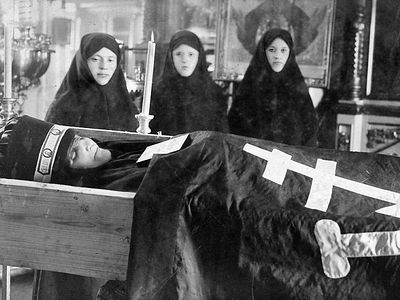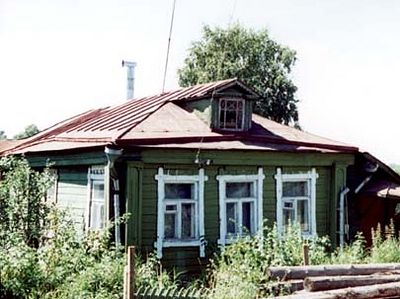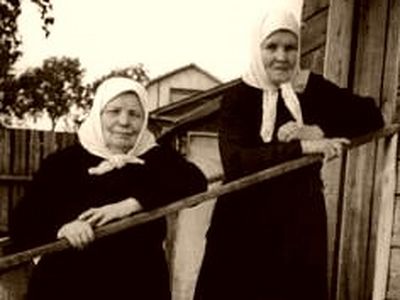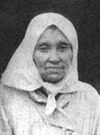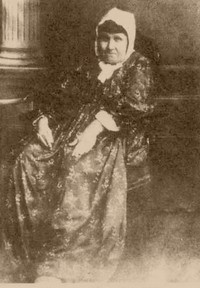 Blessed Maria Ivanovna of Diveyevo.
Blessed Maria Ivanovna of Diveyevo.
barely reached the age of thirteen. Her father died first, after her her father's death, Pelagia and Masha [Maria] moved in with the oldest son's family. But his wife made life very difficult for them, so they moved into the bathhouse. Even in her childhood Maria differed from the other children because of her unsettled character and many eccentricities. She went often to church, was quiet and kept to herself, never played with anyone, was never frivolous; she never occupied herself with her outer appearance but was always dressed in some torn, d.iscarded dress.
The Lord took special consideration for her, knowing herfuture zeal for God, and she often saw the St. Seraphim Diveyevo Convent before her eyes during her work, although she had never actually been there.
One year after her father died, her mother also died. With her mother gone it became impossible to live with her relatives One summer day several women and girls gathered to go to Sarov, and Maria asked leave to go with them. She did not return home after this. Having no permanent shelter, she wandered between Sarov, Diveyevo, and Ardatov, hungry, half-naked and persecuted.
No matter what the weather, be it winter or summer, frost or heat, in spring thaw or autumn rains, she always wore bast shoes, often torn, without leggings. One day she walked to Sarov for Passion Week in the time of the worst flooding. The water was knee-deep, mixed with dirt and snow. A man passed her on his cart and, pitying her, called her to come and ride with him, but she refused. In the summertime, Maria apparently lived in the woods, for when she came to Diveyevo her body was covered with ticks, and many of the bites were already open sores.
She was most often in the Seraphim-Diveyevo Convent. Some of the sisters there loved her, perceiving in her an unusual human being, and they gave her clean, sturdy clothing in place of the rags. In a few days, however, Maria returned disheveled and dirty, bitten by dogs and beaten by evil people. Other nuns did not understand her podvig, did not like her, and persecuted her, complaining to the village policeman about her so that he would use his vested authority to free them from this coarse and lousy "waif." The policeman took her away, but he could not do anything with her because she seemed to be a complete fool, so he let her go. Maria again went to stay with people and often, as if screaming, would reproach them with their secret sins, which caused many to dislike her.
No one ever heard from her any complaint, moaning, or unhappiness, nor irritability nor lamentations over human unfairness. The Lord Himself glorified her among the people for her God-pleasing life, her great humility and patience. People began to notice that what she would say or warn about would come to pass, and that those with whom she stayed would receive grace from God.
One woman, Pelagia, had twelve children, but they all died before the age of five. During the first of her married years, when two children had died, Maria Ivanovna came to them in the village, walked up to her window and sang, "Little hen, feather-leg, has a few children."
The women there told her, "She has no children at all." She answered, "No, she has many." They insisted, "No, she doesn't have any." Then Maria Ivanovna made it more clear to them, "The Lord has many places."
One day she said to the woman, "Go, go quickly, Nucharovo is burning." But the woman was from Ruzanovo. She arrived in Ruzanovo and everything was all right, nothing had happened, so she was perplexed when someone yelled, We're burning!" Soon all of Ruzanovo burned from one end to the other.
Maria Ivanovna received her spiritual nourishment from Blessed Prascovia Ivanovna, to whom she went for advice. Prascovia Ivanovna herself, aware of her imminent repose, told those close to her, "I am still sitting at the loom, and another is already weaving. She still walks, but soon she'll sit." Blessing Maria Ivanovna to stay at Diveyevo, she said to her, "Just don't sit in my armchair." (Maria Ivanovna lived in Blessed Pasha's cell for only two years.) On the very day that Blessed Pasha [Prascovia] of Sarov died, Maria Ivanovna experienced a small temptation. Greatly vexed by her eccentricities, the nuns threw her out of the monastery, telling her never to return, or they would call the police. The blessed one said nothing to this, turned and left.
"Before the carrying of Blessed Pasha's coffin into the church, a peasant came and said, "What a slave of God you have banished from your monastery; she just told me my whole lifeand all of my sins. Take her back into the monastery, or you will lose her forever."
Immediately someone was sent after Maria Ivanovna. She did not wait, but returned to the monastery just as Prascovia Ivanovna lay in her coffin in the church. The blessed one went in, and turning to the eldest vestry nun, Zinovia, said, "Look—lay me down the same way, just like Pasha."
The nun became angry with her that Maria should be so audacious as to compare herself with Pasha, and replied insolently to her. Maria Ivanovna said nothing.
From that time on she settled permanently in Diveyevo. At first she lived with Nun Maria, then the abbess gave her a separate room. The room was cold and damp, especially in the spring, and the blessed one lived there almost eight years. Here she finally lost the use of her legs and a serious form of rheumatism spread throughout her body.
For almost the entire first year of her life in the monastery, the novice Pasha (in monasticism Dorothea) was sent to her. The novice did not like Maria at first but came to her out of obedience. Maria Ivanovna had even said before this that they would bring in Pasha to serve her.
Pasha grieved greatly when she saw how Maria Ivanovna was being crushed by a torturous illness and was losing her legs, but she could do nothing about it. Only when the crowds coming to the blessed one became so large that they could not fit into the tiny room did the abbess permit her to move into Pasha of Sarov's little house.
This house stood at the very gates. When the soviet authorities saw the people streaming to her cell, they stirred up persecutions against the blessed one, so that finally she was moved to a separate room at the almshouse, where she lived until the monastery was closed.
Blessed Maria Ivanovna spoke rapidly and abundantly, sometimes very articulately and even in rhymes, and she cursed, especially after 1917. She cursed so much, that the nuns would go outside so as not to hear it. Prascovia Ivanovna's cell-attendant, Dunya, once asked her, "Maria Ivanovna, why do you curse so? Mamenka[3] didn't curse like that."
"It was well for her to be blessed under Nicholas,[4] but just try being blessed under the soviet government."
The podvigs of her earlier life of wandering, sickness, prayer, and receiving people were not enough for the blessed one. One day Maria Ivanovna's cell-attendant, Mother Dorothea, went to the supply room for milk, which was quite far from the Eldress' cell, but first she put the hot samovar on the table. She returned and heard Maria Ivanovna's frantic cry, "Help!"
The confused cell-attendant at first did not understand what had happened, but then collapsed with horror. Maria Ivanovna had decided to pour herself some tea while she was away. She had turned on the spigot but she could not turn it off, and hot water was pouring onto her knees until Mother Dorothea returned. She was burned to the bone, covered with blisters all over her front and legs, and between her legs. Later K all broke open and seeped.
This happened in the worst heat of the month of June. Mother Dorothea was afraid that worms would infest the burned and necrotic flesh, but the Lord preserved His chosen one; God alone knows by what miracle the wounds were healed Without getting out of bed, she urinated in place. She was covered with perspiration and lay on a mattress without a plastic covering. They could not lift her or change the bedding easily but nevertheless she recovered.
Another time Mother Dorothea was totally exhausted, having lifted Maria Ivanovna all night for minutes at a time, so that by morning she was so weak, she simply said, "As you like, Maria Ivanovna, I can't get up; do what you want."
Maria Ivanovna quieted down, and suddenly Dorothea awoke from a terrible crashing noise: the blessed one had decided to get out of bed herself, and in the darkness she had climbed out on the wrong side, fallen on the table and broken her hand. She yelled, "Help!" She did not want to call the doctor to bind her hand in a cast, but laid it on a pillow and stayed in the same position for six months, neither getting up nor turning. She again urinated in place, because she drank much and ate very little.
From lying so much her bones were worn bare, and flesh hung from them in pieces. Again Maria Ivanovna bore this torture unmurmuringly, and only after half a year did her hand heal. However, it healed incorrectly, which is visible in certain photographs.
Maria Ivanovna accustomed those who lived with her to podvig, and because of obedience and her prayers, the podvig would become bearable. Thus, the blessed one did not allow Mother Dorothea to sleep in any other position than on one side, and if she lay on the other side, she would yell at her. Maria Ivanovna herself would pick at a spot on her leg until it bled and never give it a chance to heal.
A true ascetic and God-pleasing woman, she possessed the gifts of clairvoyance and healing.
She healed the eye of one woman named Elena, anointing it with oil from a lampada.
One nun had eczema on her arms. For three years the best doctors of Moscow and Nizhny-Novgorod tried to cure her, but they made no progress. Her arms were entirely covered with sores. She was seized with such depression that she wanted to leave the monastery. She went to Maria Ivanovna who proposed anointing the sores with oil from the lampada. The nun was frightened, for the doctors forbade her to let oil or water touch her arms. But out of faith in the blessed one she agreed, and after two times there was not even a trace of the sores.
One day a man came to see Maria Ivanovna in desperation, not knowing how he was going to go on, for his livelihood had been completely destroyed. She told him, "Become an oil manufacturer." He obeyed, took up this occupation and set his affairs aright.
About the Nizhegorod Archbishop Evdokim (Mescheryakov), a renovationist, the blessed one said even before his apostasy, "A red candle, a red bishop." She even made up a song about him: "Walking down our street is seen, with Parasha Evdokim, with his britches worn and blue, his legs long and filthy, too."
One Bishop decided to go to the blessed one out of curiosity, not believing in her clairvoyance.
He had just made to go in, when Maria Ivanovna yelled out "Oy, Dorothea, set me down quickly on the trunk." She sat down, and began to curse and complain about an illness.
The bishop was horrified at such a reception and left silently. On the way home he became sick to his stomach and felt sick the whole way home, moaning and complaining.
The blessed one yelled to Schema-nun Anatolia (Yakubovich) four years before she came out of reclusion, "Schema-nun-piggy one, get out of your reclusion."
She was in reclusion with Fr. Anatoly's blessing (Hiero-schemamonk Basil of Sarov), but her dead sister had begun to appear to her.5] Mother Anatolia got scared, and came out of reclusion, beginning to go to church. Maria Ivanovna said, "It's the demons who are kicking her out, not I."
One day a boy came to Maria Ivanovna, and she said, "Well, priest Alexis has arrived." Later he actually did become the Sarov hieromonk, Alexis. He respected her very much and came to see her often. One day he came, sat down, and said nothing. But she said, "I myself don't eat meat. I started eating cabbage and cucumbers with kvass, and I felt better."
He answered, "All right." He understood that this was pertaining to how he, fearing illness, had begun to eat some meat. From that time on he stopped.
Maria Ivanovna told Fr. Eugene that he would be ordained in Sarov. He very much believed in her and told everyone about it beforehand. But suddenly he was called to Diveyevo. The blessed one's cell-attendant, Mother Dorothea, was worried, and he was uncomfortable. They ordained him in Diveyevo. Dorothea told Maria Ivanovna about it, and she laughed, saying; "Do I have to spoon-feed you? Isn't this Sarov? The t. Saint's cell itself and all of his things are here." One day a certain noblewoman came to the blessed one from Murom. As soon as she stepped in the door, Maria Ivanovna said, "You're are a noblewoman, but you smoke like crude man."
The woman really had smoked for twenty-five years and suddenly cried, saying, "I can't give it up for anything. I smoke at night and before Liturgy."
"Dorothea, take her tobacco and throw it into the furnace.
Mother Dorothea took the elegant cigarette case and lighter and threw them into the furnace. A month later she received a letter from her and a dress, sewn out of thankfulness. She wrote that she did not even think about smoking, as if it had been simply taken away from her.
Rimma Ivanovna Dolganova suffered from demonic possession; it manifested itself in that she collapsed before holy objects and could not receive Communion. She began to ask the blessed one if she could join the monastery.
"Well, what do we need from such people as you?.
"Maybe I'll get better?" Rimma Ivanovna asked hopefully.
"You will be free before you die."
That very night she fell ill with scarlet fever and went to the hospital, saying that she would never return. She reposed, and not long before her death she was healed of her possession.
One day Vera Lovzanskaya (subsequently Nun Seraphima) came to Maria Ivanovna to ask to join the monastery. The latter saw her and yelled, "Don't! We don't need her! Don't!" Then she laughed and said, "You have to take care of your father in his old age. Go to Bishop Barnabas; he'll give you work." It later turned out that the nun Seraphima took care of her spiritual father, Bishop Barnabas (Belyaev), until his very death.
In the monastery lived the Fool-for-Christ, Onisim. He was very friendly with blessed Maria Ivanovna. She used to call him her bridegroom, and walked with him arm-in-arm Sometimes they would get together and sing, "With the saints give rest...."
Onisim lived his whole life in the monastery and began to refer to himself in the feminine gender, as "she." When Tsar Nicholas Alexandrovich came for the opening of the relics of St. Seraphim, there were so many people that they had to close the gates. But Onisim was left outside the gates and yelled, "Oy, I'm one of us, [ya nasha—the feminine form—Trans.] I'm one of us; let me in, I'm one of us."
One day Maria Ivanovna said to Vera Lovzanskaya, "Well, Oniska is taking my girl far, far away."
Only when Bishop Barnabas himself took on the podvig of Foolishness-for-Christ, and she went to him in Siberia, did it become clear to Vera what Maria Ivanovna was talking about.
Before she left for Central Asia, Vera Lovzanskaya went to see Maria Ivanovna to say good-bye and receive her blessing. Diveyevo Monastery was closed, and Maria Ivanovna lived in the village.
Vera left Arzamas early in the morning, and she had to walk thirty-eight miles to Diveyevo. It was December and cold. She went out onto the road, and saw a man on a sledge-He stopped. "Where are you going?"
"I'm going to Diveyevo."
"Good, I'll take you."
They rode to the village of Kruglie Pani. There was a tavern. The driver went to get a bite to eat and drank a decent amount. On
the way they veered to and fro, and the sledge kept running off the road and getting stuck in the snow; but the horse somehow guided himself, and finally they stopped at the house where Maria Ivanovna lived. It was one o'clock in the morning. The man woke up and began to bang on the window with all his might. The nuns opened the door. They told them what was going on. All this time the blessed one had been raving, banging on the table and yelling, "A drunken man is driving a girl! A drunken man is driving a girl!"
"What drunken man, what girl?" the nuns could not understand. But the blessed one only yelled, "A drunken man is driving a girl!"
One day a lady of the intelligentsia came with her two boys. The blessed one immediately yelled, "Dorothea, Dorothea, give me two crosses; put them on the boys."
Dorothea said, "Why should we give them crosses? They received Communion today."
But Maria Ivanovna was making a scene, screaming, "Crosses! Give them crosses!"
Dorothea took out two crosses, unfastened the children's jackets; and it was true, they had no crosses.
The lady was very embarrassed when Dorothea asked her, "How could you give them Communion without crosses on?"
She muttered in reply that she had taken them off along the road, so that they wouldn't bother the children.
After her came a schema-nun.
"Why did you put on the schema? Take it off, take it off, Put on a headscarf and bast shoes, and put a cross on her, will you?" Maria Ivanovna said.
With trembling Mother Dorothea went up to her. It turned out that she had no cross. She said that she had lost it along the road. Bishop Zenobius (Drozdov) asked Maria Ivanovna, "Who am I?"
"You are a priest, but Metropolitan Sergius6] is an archbishop."
"And where will they give me a bishopric? In Tambov?" "No, in Cherevatov.7]
The Artsibushevs had a very good breed of cow, but that summer she did not breed; and consequently the family would have to go all winter without milk, and they had small children and no means of support whatsoever. They decided to sell the cow and buy another one, so they went to Maria Ivanovna, to ask her blessing.
"Bless us, Maria Ivanovna, to sell the cow."
"Why?"
"She's not fertile. What are we going to do with her?"
"No," Maria Ivanovna replied, "she's fertile, fertile I tell you. It will be a sin if you sell her—the children will go hungry."
They went home perplexed, then called an experienced village woman to look over the cow. The woman claimed that
the cow was not fertile.
The Artsibushevs again went to Maria Ivanovna and said, "The cow is not fertile, says the old woman."
Maria Ivanovna, perturbed, cried out, "She's fertile, I tell
you, fertile."
She even beat them.
But they did not listen and went to the bazaar to sell the cow. Someone offered ten rubles. They were offended and did not sell her, but they looked at a calf anyway and gave a down payment of ten rubles.
But Maria Ivanovna held fast—she scolded them, yelled and raved. And what do you know? They called the doctor and he said that the cow really was fertile. They ran to Maria Ivanovna and fell at her feet. She said, "Give them back the calf, and let the down payment go." And so they did.
On December 31, 1926, near the New Year of 1927, the blessed one asked Nun Seraphima (Bulgakova), "Go outside and take a look. What kind of half-moon is it, sharp or dull?" When she was told, the blessed one said, "Well, the old women will be dying… What a year is coming, what a difficult year—Elias and Enoch are already walking the earth…" And it was true—from January 1 for two weeks there were funerals, sometimes more than one per day. She would speak about this often, even during the Vigil services.
During the week of the Publican and the Pharisee, the authorities came to throw the monks out of Sarov, and the expulsion stretched until the fourth week of Great Lent.
It was difficult to cast the monks out of Sarov. Almost all of them had separate cells with separate entrances with several different keys. One day they would send a monk away, and the next day he would return and lock himself in. The services continued in the church. Finally on Monday of the week of the Veneration of the Cross, many of the authorities came. They confiscated all of the holy objects: the Miracle-working Icon of the Life-giving Spring, the coffin case wherein the relics of St. Seraphim had lain in the earth for seventy years, the cypress casket from which they took out St. Seraphim's relics, and other objects of veneration. They threw them all together in a heap, made a bonfire and burned them near the Dormition Church, between the church and the Royal Suite. Novice Boris managed to photgraph this.
They placed St. Seraphim's relics as they were—tied in his mantia and clothing—in a blue prosphora chest, and sealed it. The people divided themselves into four parties and rode on sledges in four different directions in order to discover where they were taking the relics. The box with relics was taken to Arzamas through the village of Unuchino, where they stopped to spend the night and feed the horses. No matter how they tried to conceal things, when the troika [three-horse sledge] with the relics arrived at the village of Kremenki, the alarm bell was rung in the bell tower. The relics were taken straight to Moscow, but when they opened the box, there were no relics. When they had lodged for the night, the blasphemers had become very drunk.
After the monastery was desecrated, the services in Sarov ceased, and the monks went their own separate ways. The Monastery was closed during the fourth week of Great Lent.
After Pascha the authorities arrived in Diveyevo. There was a search throughout the entire monastery; they recorded the contents of the treasury and conducted a search of personal belongings. It was spring, everything was in bloom… During these difficult days Sonya Bulgakova (later Nun Seraphima) went to Maria Ivanovna, who was sitting calmly, unruffled.
"Maria Ivanovna, will we live peacefully any longer?" "We will." "How long?" "Three months."
The authorities left. Everything continued as usual. They lived this way for exactly three months, and just before the Feast of the Nativity of the Mother of God, on September 7/20, 1927, everyone was asked to leave the monastery. During that whole summer, life in the monastery during the day had continued as usual. But the moment night would come, from somewhere owls would fly in, sit on the roof of all the convent buildings and fill the whole monastery with ominous hooting' and so it was each night. When they announced the monastery's closure, all of the owls disappeared.
At that time, two Bishops lived in the Convent: Zenobius of Tambov and Seraphim of Dmitrov. The former served Liturgy on the Feast of the Nativity of the Theotokos, in the Nativity of the Theotokos Church.
Bishop Seraphim served in the big Cathedral. After Liturgy, he gave a sermon with the following words: "Now each of us is presented with a cup. But some will drink one-fourth, or half, or the whole cup to the dregs… Now in the Monastery we are all burning as one huge candle, but now the time has come when this flame will be divided into small, separate candles." That night both Bishops, Mother Abbess and the elder sisters were arrested and sent to Moscow. Soon they were released, but banned from living in the same place.
On the Feast of the Exaltation of the Cross, the last service was held in the Joy of All Who Sorrow Church. After Liturgy the choir began to sing the hymn from Forgiveness Sunday, the "Lamentation of Adam." Then all the sisters bid each other farewell. Everyone in the church was crying. The sisters then had to hide in various local towns and villages.
By the blessing of Bishop Barnabas a cell was built for Maria Ivanovna in the village of Puzo. She was taken there right after Diveyevo Monastery was closed. The resettlement was presided over by Valentina Dolganova, who carried it out in such a way that no one had any access to the blessed one any longer. During that time she was asked "How are things?" She spoke much and described religious processions: "There they were, walking with lanterns and icons, splashing in the terrible mud to Ardatov, and returning with the procession. And how many ecades have we been walking with the cross?!"
Maria Ivanovna was in Puzo for about three months. When AbbessAlexandra moved to Murom, Mother Dorothea came to see her. "Why did you give Maria Ivanovna over to the world?" she asked. "Take her back," the Abbess told her. She went to get her." Maria Ivanovna, are you coming with me?" "I'm coming," she replied
They put her on a cart, covered her with a red blanket and took her to Elizarovo. She lived there until spring, when they took her to Diveyevo to a deaf and dumb brother and sister, and in 1930 to a rural house near the village of Pochinok. Finally, she was taken to Cherevatovo, where she reposed on August 26/September 8, 1931—the night of the feast day of the Vladimir Mother of God. That night there was a terrible storm. They buried her there in the Cherevatovo cemetery.8]
Before her death, many sisters came to visit her. She would at first be violent, but then would become very gentle, saying, "Oh, my kittens have arrived." Maria Ivanovna told many people about their future lives. Someone said to the blessed one, "You keep saying, 'Monastery', Maria Ivanovna! There won't be any monastery!"
"There will be! Will be! Will be!" and she even banged the table with all her might. She always banged on it so hard that she bruised her hands; they put a pillow under her hand so that it would not be so painful.
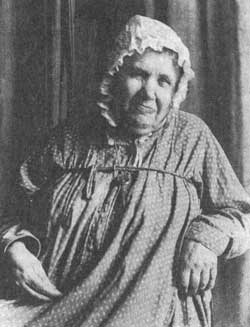
One of the nuns in prison had a dream. St. Seraphim was conducting two nuns into the yard saying, "I am conducting my beloved ones into the prison." And as she woke up she looked through the window; the two sisters were walking up to the prison. At the same time the daughter of Metropolitan Seraphim Chichagov (the author of the Diveyevo Chronicles) saw a dream: some nuns were sitting at a table, and the Queen of Heaven was indicating which of the nuns was to be taken to prison.
She assigned obediences to all the sisters of the future monastery: one to cut the hay, another to clean the canal, another to do something else, but she never said anything to Sonya Bulgakova. Sonya asked one day, "Maria Ivanovna, will I live to see the monastery?"
"You will," she answered quietly but firmly, squeezing her hand and pressing it to the table to the point of pain.9]
Before she died Maria Ivanovna told all of the sisters close to her how many kathismas they should read until the fortieth day [after her repose]. It was all carried out exactly, but she had told Sonya Bulgakova when she was with her for the last time, in October of 1930, "But you won't read a single kathisma for me." She actually never did read anything, but remembered it only on the fortieth day.
From New Confessors of Russia by Abbot Damascene (Orlovsky), (Platina: St. Herman of Alaska Brotherhood, 1998).



